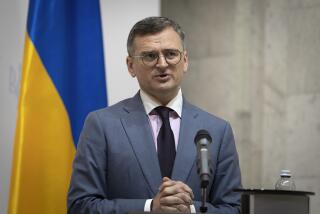Russia Faces More Turmoil as Key Finance Official Quits
- Share via
MOSCOW — A day after issuing a rough draft of its economic rescue plan, Russia’s untested government was thrown into disarray Friday when the man in charge of renegotiating billions of dollars in debt with the West suddenly quit.
Alexander N. Shokhin, a deputy prime minister, said he was resigning to protest the reappointment of the finance minister who was in place six weeks ago, when decisions by the previous government threw Russia’s banking system and economy into chaos.
The unexpected exit of Shokhin, a centrist, deprives Prime Minister Yevgeny M. Primakov’s new Cabinet of a figure familiar to the overseas lenders, public and private, who have bankrolled change in Russia and are increasingly anxious about the fate of their money--and Russia itself.
“The government hasn’t yet outlined its program in full, hasn’t taken any meaningful steps, but it is already rocked by its first crisis,” said Andrei A. Piontkovsky, director of the Independent Institute for Strategic Studies, a Moscow think tank. “This once again proves how weak this government is.”
Mikhail M. Zadornov was finance minister when, on Aug. 17, the government of Prime Minister Sergei V. Kiriyenko decided to effectively devalue the ruble and freeze repayment on an estimated $40 billion in government bonds, many of them held by Western banks.
The decision sent tremors through global markets already chastened by enormous losses from the economic crisis in Southeast Asia, and it spurred investors to dump many of their riskier holdings.
Zadornov, 35, was reappointed Friday in a decree signed by President Boris N. Yeltsin. Shokhin, a minister in four governments who first began negotiating with Russia’s creditors in the International Monetary Fund and World Bank in 1993, said it sent the wrong signal to retain “the man who made financial markets collapse.”
Shokhin also noted that Anatoly B. Chubais, the man who negotiated a $4.8-billion loan from the IMF in July, said in a published interview this month that the Russians had “conned” international financial institutions.
“I had thought that we needed to renew the face of the financial part of the government so as not to create the feeling we are negotiating only to take the money and swindle our partners later,” the 47-year-old Shokhin said.
Using uncharacteristically strong language, Primakov accused his departing subordinate of taking an “irresponsible” and “capricious” step but said in a statement that his Cabinet was continuing its work undisturbed.
Piontkovsky, the Moscow analyst, said he believes that Shokhin’s objection to Zadornov’s reappointment was a pretext.
“The real reason is that Shokhin doesn’t believe in the success of this government and would feel more comfortable as a leader of one of the main factions of the Duma,” the analyst said, referring to the lower house of parliament.
Until April, Shokhin was parliamentary leader for former Prime Minister Viktor S. Chernomyrdin’s Our Home Is Russia Party.
Confirmed as prime minister by the Duma on Sept. 11, Primakov has had a difficult time assembling a Cabinet, with some people approached declining to serve.
Many top posts are held by former Soviet apparatchiks, like the 68-year-old Primakov himself, or members of Russia’s current Communist Party.
But Zadornov is well-known for his commitment to free-market economics and monetarism. So along with drawing fire from Shokhin, he could anger Communists, who hold the largest bloc of votes in the Duma and believe that the democratic and free-market “reforms” begun in Russia in 1992 were little more than an excuse for looting the country.
“We declared that we will carry out a policy of electoral support for the government if it is capable of carrying out a qualitatively different course,” Communist leader Gennady A. Zyuganov said Friday.
Before making his resignation public, Shokhin met with IMF negotiators on an emergency visit to Moscow but appeared to come away empty-handed.
“It would be shameful to leave Moscow without cheering up the world by announcing results,” Shokhin told the IMF team, according to Russian media. But the negotiators did not recommend that Russia be given the $4.5-billion installment it had originally been scheduled to get this month on top of the $14.8 billion in IMF loans already received since 1992.
Some observers took Shokhin’s resignation as a sign that the IMF has made clear there will be no more money for Russia in the foreseeable future. Unless Russia is granted a break by the IMF, next year it is supposed to begin repaying $7 billion of the money it has borrowed.
More to Read
Sign up for Essential California
The most important California stories and recommendations in your inbox every morning.
You may occasionally receive promotional content from the Los Angeles Times.













